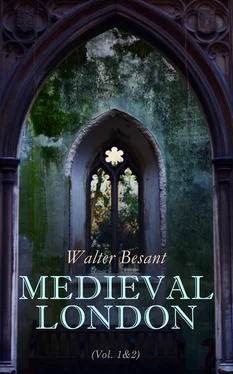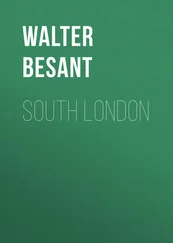Pellipers, or Skinners, Girdlers, Hostlers and Haymongers, Tapicers, Butchers, Bakers, Taverners, Vintners, Cutters, Brewers, Spurriers, Whittawyers, Turners, Heaumers, Hatters, Pewterers, Glovers, Shearmen, Furbishers, Braelers, Masons, Farriers, Wax Chandlers, Alien Weavers, Tylers, Dyers, Plumbers, Tawyers, Flemish Weavers, Bowyers, Fletchers, Pouch Makers, Blacksmiths, Leather Sellers, Poulterers, Cordwainers, Barbers, Fullers, Hurers, and Cheesemongers. Some of the articles of the new Companies will be dealt with in another place.
The Black Death of 1349-50 caused a dearth of labour which ran up wages enormously.
Some attempt to fly in the face of the effect of demand upon supply was made soon after the Pestilence by a Proclamation issued (24 Ed. III. 1350) by order of the Mayor, Walter Turk, the Aldermen and the Commonality in which wages were laid down “to be held and firmly observed for ever.” This proclamation gave the craftsmen 6d. a day in the summer months and 5½d. a day in the winter. Any employer who paid more was fined 40s.:—any craftsman who took more was sent to prison for 40 days. It seems strange that in a commercial and industrial city it could be supposed possible to regulate wages and prices “for ever,” or for a week. Like so many other mediæval laws and ordinances there is no proof whatever of any obedience, while in the trials that follow there is no case reported of disobedience. We may assert without fear of contradiction that the proclamation fell dead, and that the craftsmen continued to make the most of the situation.
The relations of Edward III. and the City, on the whole of a cordial kind, are illustrated by some of the papers in Riley’s Memorials. Thus, in November 1328, the King and the Queen being at Westminster, the City resolved to send them a present, and these were the seasonable gifts they sent:—
“To our Lord the King:—10 carcasses of beeves, price £7: 10s.; 20 pigs, price £4;—these being bought of Nicholas Derman: 24 swans, price £6; 24 bitterns and herons, price £4: 4s.; and 10 dozens of capons, price 50s.;—the same being bought of John Brid and John Scott: 5 stone of wax, price £19: 19: 0¾; 4 barrels of sturgeon, price £12; 6 pike and 6 eels, price 10 marks;—these being bought of Hugh Medefrei.
To our Lady the Queen:—5 carcasses of beeves, price 75s.; 12 pigs, price 48s.;—these being bought of the said Nicholas Derman: 12 pheasants, price 48s.; 12 swans, price 60s.;—these being bought of the said John Brid and John Scot:—3 stone of wax, price £11: 19: 5¼; 2 barrels of sturgeon, price £6; also, 3 pike and 3 eels, price 66s. 8d.
Sum total paid for the gift aforesaid, £95: 13: 6.”
Nine years later, at the meeting of Parliament, held in London, the City voted a great number of gifts to the King, the Queen, the Archbishop of Canterbury, the Bishops of London and Durham and many great Lords. To some, money was given, to others, silver plate, silk cloths, gloves for holding the marks. Apparently, the gifts were intended to buy their favour, for the City got a charter which secured their liberties, although they had appeared in danger from the new statutes about the Staple.
While mentioning these presents we may state that in the year 1363 we find a dozen trades uniting to send a small present of money, amounting in all to no more than £40, to the King. Four companies also present King John of France, then a captive, with money amounting in all to £24: 6: 8; and in the year 1371 a magnificent present of plate costing, for the time, a vast sum of money, was given to the Black Prince on his return from Gascony.
In 1357 the King, evidently from his own observation, called attention to the lay stalls and filth allowed to accumulate on the banks of the river, and gave orders that all should be cleaned up without delay. In the same year he ordered the streets to be kept free of such impediments. And, which shows a glimmering of sanitary science, he orders that this refuse shall be put into carts and taken out of the City, or into the dung boats which were probably intended to carry the refuse down the river; but nothing was to be thrown into the river. When one remembers the uses to which the Walbrook and the Fleet, together with the banks of the Thames, had been put, it is easy to understand that it was necessary to do something. At the same time, the Thames is a broad river, and capable of cleansing itself from a good deal of corruption.
In some cases of robbery or violence the King interfered himself. Thus in 1359 the King ordered the Mayor to make Inquisition into a robbery committed at the House of the Crutched Friars in Hart Street, Aldgate, and to send him the result of his Inquisition. The case is curious, one that implicated certain Brethren of the House. The things stolen consisted of a chalice, two sets of vestments, many valuable books and other goods, the whole valued at £87: 13: 4, i.e. over £1200 of our money. The robbers were Robert de Stannowe, John de Dunmowe, and Richard de Evesham, all Brethren of the Holy Cross. The witnesses, John Bretoun and eleven others, swore that these three were all malefactors and disturbers of the Peace of our Lord the King, and that they stole these things and “committed other enormities.” What became of the sacrilegious three is not known. Possibly the Bishop’s prison could reveal the secret.
There is also a proclamation against sturdy vagrants who get alms “which would otherwise go to many poor folk, such as lepers, blind, halt, and persons oppressed with old age and divers other maladies.” They are ordered to be put in the stocks and then to forswear the City for ever. Nothing is as yet said about whipping vagrants through the streets.
There is a proclamation against evening markets. Nothing was to be sold after sunset because it is easy in the dark to pass off old things for new.
Another scare of a French descent took place in 1370, when it was reported that certain galleys were lying off the Foreland of Thanet. It was ordered that a watch should be kept every night between the Tower and Billingsgate, to consist of 40 men-at-arms and 60 archers. The companies were to form the watch in the following order:—
Sunday. The Ironmongers, the Armourers, and the Cutlers.
Monday. The Tawyers, the Spurriers, the Bowyers, and the Girdlers.
Tuesday. The Drapers and the Tailors.
Wednesday. The Mercers and the Apothecaries.
Thursday. The Fishmongers and the Butchers.
Friday. The Pelterers and the Vintners.
Saturday. The Goldsmiths and the Saddlers.
The bad government of London at this time is illustrated by the decay of archery. The recent victories in France had proved the immense superiority of the archers to the mounted knights in battle: yet we find the youth of London allowed to neglect a weapon which could only be serviceable if its practice was encouraged and ordered. On this subject we find that the King sent the following letter to the Sheriffs of London in the year 1365:—
“The King to the Sheriffs of London , greeting.
Because the People of our Realm, as well of good Quality as mean, have commonly in their Sports before these Times exercised the Skill of shooting Arrows; whence it is well known, that Honour and Profit have accrued to our whole Realm, and to us, by the Help of God, no small Assistance in our warlike Acts; and now the said Skill being, as it were, wholly laid aside, the same People please themselves in hurling of Stones and Wood and Iron; and some in Hand-ball, Foot-ball, Bandy-ball, and in Cambuck, or Cockfighting; and some also apply themselves to other dishonest Games, and less Profitable or useful; whereby the said Realm is likely, in a short time, to become destitute of Archers:
We, willing to apply a seasonable Remedy to this, command you, that in Places in the foresaid City, as well within the Liberties as without, where you shall see it expedient, you cause publick Proclamation to be made, that every one of the said City, strong in Body, at leisure Times on Holidays, use in their Recreations Bows and Arrows, or Pellets, or Bolts, and learn and exercise the Art of Shooting; forbidding all and singular on our Behalf, that they do not after any Manner apply themselves to the throwing of Stones, Wood, Iron, Hand-ball, Foot-ball, Bandy-ball, Cambuck, or Cockfighting, nor such other like vain Plays, which have no Profit in them, or concern themselves therein, under Pain of Imprisonment. Witness the King at Westminster, the twelfth Day of June.”
Читать дальше












